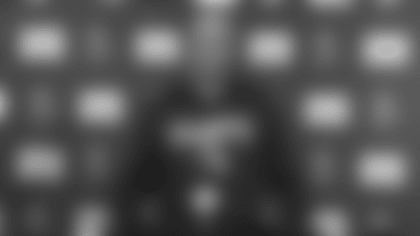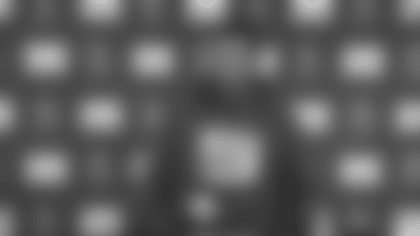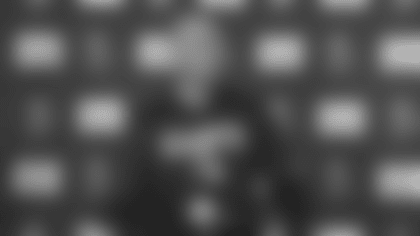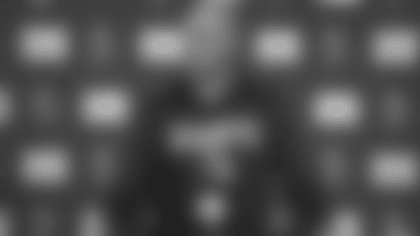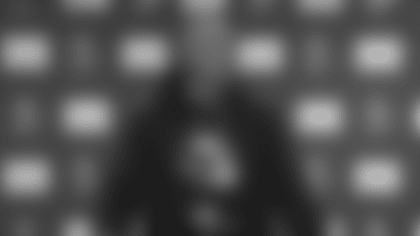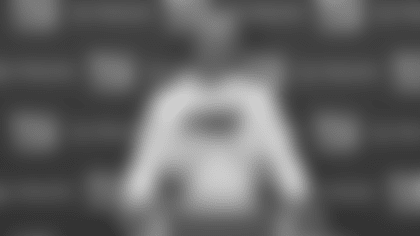Assistant Head Coach/Offensive Coordinator Mike Kafka
Q: What have you seen from (quarterback) DJ (Daniel Jones) in the last week and a half since getting benched and the way he has responded?
MIKE KAFKA: I thought DJ (Daniel Jones) has been the same. He approaches every day like a pro. He comes into work. In the meetings has been really good at communicating with the offensive line, the skill group and with the coaches as well. Talking with him about the game plan this week. I think we're all excited, but today's the most important day of the week so far.
Q: (Running back) Tyrone Tracy has talked a lot about the transition from wide receiver and how he's still learning as a runner. When you see him set up some of the runs that he did in Pittsburgh, what does that say about the feel that he's gaining as far as being able to read plays, be patient enough, and then break them off when the hole's there?
MIKE KAFKA: I would say (Tyrone) Tracy has had some really good production. I think that's kudos to, number one, the offensive line. The offensive line's done a really nice job. (Offensive Line Coach) Carm (Carmen Bricillo) and (Running Backs Coach) JT (Joel Thomas) and the running back group, along with (Tryone) Tracy, getting the most out of it and maximizing those opportunities. I think (Tyrone) Tracy, every day, has come to work, continuing to get better. Things that he sees in practice that's maybe not super clean or not perfect, they get the adjustments, they get it fixed and the next day it looks a lot better. Going through that process with a young player potentially seeing some things for the first time, which happens. But he's done a great job of seeing it and being presented with those things and keep on working on it.
Q: Obviously you guys liked him enough to take him, (Tyrone) Tracy. Did you see what we've seen so far this season, the potential there right from when you first got him?
MIKE KAFKA: Yeah, whenever you draft a guy, you see a certain role for him or a certain aspect of his game that could help us. I think what (Tyrone) Tracy's done, just taking advantage of the opportunities when (running back) Motor (Devin Singletary) went down, him stepping up and then just having the run game and the pass game be effective for him. That was stuff that we saw on tape that we thought he could fit well within our offense.
Q: I know this isn't what you're scouting this week, but what have you seen from (Washington Commanders quarterback) Jayden (Daniels) just to have the success that he's had so quickly as a rookie?
MIKE KAFKA: Just watching him from afar and maybe a couple of the carryover games or just some of the highlight stuff that he's had, he seems to be playing pretty efficient with explosives in the pass game. I know he's leading the league in rushing as a rookie. So, I think he's having some production in the run and pass game, but I haven't watched a whole bunch of him, to be honest with you.
Q: Is there a magic formula? We talk about throwing with anticipation for a quarterback, but obviously the defense can influence that. So, is there a magic formula to kind of close the gap a little bit with throwing to a receiver and hitting him in stride?
MIKE KAFKA: It all starts with the protection, with the five guys up front. It could be included with the (running) backs and tight ends as well. But then after that, from a quarterback standpoint, it's about your feet and the timing of your feet. It's about the route depths. We talk about that in the receiver room. So, all that stuff's got to match up. Then the coverage can also dictate that as well. So, we're seeing post-snap coverage and playing split safety defenses. Where does that zone in that defense or that spot in that defense, where is the open area? And then, how does the quarterback time up his feet and the receiver time up his depth to get to that spot to effectively attack that defense.
Q: Is it fair to say then the thing that the quarterback can control most is his feet and just getting set?
MIKE KAFKA: Yeah. I think that's the things that we stress. I don't think I'd say that's the number one thing. Eyes, snap counts, things that can happen pre-snap can help you understand what's going to happen post-snap. So, you can use all that information to your advantage. Then the fundamentals of your feet, your eye positioning, who you're looking at and then timing it up with the demeanor of the receiver as well. It's a lot of things we work at every day, but that happens time over time on any given play.
Q: When you look at Washington's defense, one of the guys who seems to be disruptive lately is this guy (Washington Commanders linebacker) Frankie Luvu. Is he somebody you have to account for?
MIKE KAFKA: Absolutely. We remember him when he was in Carolina. He had a productive game against us a couple of years back. He flies around. He flies around and he does a nice job in that defensive scheme. You absolutely have to know where he's at.
Defensive Coordinator Shane Bowen
Q: Take us through the decision to take (cornerback) Deonte (Banks) out during the game. How much of that was you or how much of that was kind of above you?
SHANE BOWEN: Yeah, we made a decision as a coaching staff. Really just decided, had a conversation about it, made a decision. Really looking forward to seeing how he does this week practicing. Full confidence he's going to practice well this week, prepare well this week, and then be ready to go come Sunday to play well.
Q: Why was that decision made?
SHANE BOWEN: Honestly, right now we're focused on improving, getting better, and being ready for this week.
Q: What did you want to see him improve?
SHANE BOWEN: Everything, just like all these other players. Everything. As we talk to these guys individually, it's starting with technique, fundamentals, making sure we're locked in across the board. Every single guy, every single play has got to be ready to go. That's the drive for us as a unit right now. There's plays here and there, four or five plays a game that are costing us. We've got to do a good job making sure we're improving and we're ready when those plays are there for us to make that we're able to make them across the board. Confident in Tae, excited for the growth we're going to see from him as this thing continues. Again, another young player, so no different than these other young guys that we're playing with. Just continue to grow, continue to improve, continue to get better each week.
Q: What makes you confident that he will improve and come back?
SHANE BOWEN: Yeah, he's been locked in. Again, he's a professional. It's a professional football league. Being able to respond when adversity hits, that's a big part of this game. You've seen it from him. I've seen that from him already, being able to respond, come back, play really well in Seattle, came back when adversity had hit him a little bit. So, I think with all of them, just understanding being a pro and what that is and being ready to go and respond when adversity hits.
Q: When you look at some of the breakdowns that you've had, the big play breakdowns, how much of that is guys trying to compensate for other guys who maybe missed an assignment or didn't do their jobs properly?
SHANE BOWEN: Yeah, I mean in the passing game, it was more one-on-one type things. Threw the ball down the field, they made plays, we didn't. In the run game, I think some tackling showed up that extended some of those. Early especially, I think early we were a little out of sorts with our tackling, being able to get guys on the ground. After that, really those first couple drives, I thought we settled in a little bit against the run and played it better as we went. We just got to continue to eliminate the explosives. Those are what's killing us right now. We're giving up those four to five to six runs a game that are chunk plays that we got to do a good job of working to eliminate.
Q: Has anything that (outside linebacker Azeez) Ojulari done surprised you or what has made him so effective now that he's had this opportunity?
SHANE BOWEN: Yeah, I've been really pleased with Azeez and what he's been able to do. Again, it's a professional football league, faced adversity, brought (outside linebacker) Brian Burns in, fell into a backup rotational role, kept working, kept responding to adversity, to a challenge in front of him. And then when his opportunity presented itself, he's taken full advantage. So, really proud of him and the way he's went about his business through the offseason, through training camp, up to this point. And excited to see the production that he's having for us right now.
Q: Is it going to be easier this week to get everyone's attention when you're practicing Hail Mary defense than it would normally be?
SHANE BOWEN: Yeah, I think they're going to be a lot more focused. It's something we go through every week, make sure we're on the same page, and we execute at a high level. Again, this is the second one this year. So, these quarterbacks are buying time, they're launching it, and there's a lot of good playmakers out there that are coming down with the ball.
Q: How different is (Commanders quarterback) Jayden Daniels now versus when you saw him in Week 2?
SHANE BOWEN: Yeah, I think early on, I don't know how much (Commanders wide receiver Terry McLaurin) 17 was utilized going into that game for us. Obviously that connection has skyrocketed over the past few weeks here. He's having a heck of a year. The shots down the field, they're on target, they're catchable balls. I think the run game is always a factor, the scrambles, everything with him. I mean even with the ribs last week; I think he had eight carries for 52 or something like that. So that's always part of it, but you see the growth, especially in the passing game, you see the growth from him getting more comfortable back there. He can make every throw. He's able to make every throw going into the first game too. So, elite quarterback as a rookie who can really do a lot of things that can hurt you.
Q: As a defensive coordinator, have you kept stuff in your back pocket knowing that you played him in week 2, he's coming back this week, just so it's different?
SHANE BOWEN: Yeah, I think week to week, you always do that. Anytime you're in division, something you look at, you're able to see the first game only being six weeks removed, seven weeks removed, whatever that is. You want to try to have some answers, be able to present some different things to them, just like they're probably going to try to do to us that complements some of the looks that they had in week 1. But again, it's week to week for us in terms of game plan and how we're going to approach it, but we definitely look back on that second game and kind of see where we were successful and where things didn't go so hot for us.
Q: How different is it for you, just for yourselves, knowing that where you were week 2 to where you are now, I would imagine feel has something to do with it too right? What you know you can do, what your strengths are, what your weaknesses are.
SHANE BOWEN: Yeah, always. I think being able to put our players in the best position to be successful and that changes weekly based on who we're going against skill-wise, who we're going against quarterback-wise, up front, who we're going against. So absolutely, I think the more understanding you have of yourself and the matchups and the personnel that they present, the more comfortable you feel obviously going in with a plan that you commit to. But again, come Sunday, you've got to be able to adjust. If things aren't working out the way you want them to out of the gate, you've got to be able to adjust and find answers. And they're an explosive offense. I think they're top three in just about every category. They've got really good quarterback play. They've got an elite receiver outside. They're running the ball. I think they have four games with over 200 yards rushing. So, there's going to be some plays. We've got to understand that and hopefully we can fight through it, and we can continue to play and be able to get off the field when we're able to get some third downs, be able to get off the field. And if they get down the red zone, being able to find some stops.
Q: You gave (cornerback) Dru (Phillips) more opportunities on the boundary. What did you see from him? What has he shown to be able to get those opportunities? And do you think he's shown enough to continue that inside-outside?
SHANE BOWEN: Yeah, I was pleased with him going out there and playing. First time doing it for us. I thought he handled it well. Some things, just feel things, I think as he plays out there more and he's out there more, he's going to get more comfortable with, and just the spatial awareness, some of that type of stuff. So pleased with him. Hopefully we can see where that goes moving forward.
Q: Did you agree with (defensive lineman) Dexter (Lawrence II) that there wasn't good enough compete on that (Steelers wide receiver George) Pickens touchdown that got called back? And how do you prevent frustrations from boiling over on the side?
SHANE BOWEN: Which one?
Q: The two-tap.
SHANE BOWEN: That one? No. I think Tae did a good job coming off, breaking it up. I'd like to see him stab and try to get the ball out, but he challenged, he got back there, he knocked him out of bounds. So, I don't think it was that one play in particular that probably Dexter was referring to. Just thought out of the gate, I didn't really do a good enough job having those guys ready to go. I felt like we were a little sloppy, not really as locked in as we needed to be fundamentally. The tackling really showed up early for us. So, I get Dexter's frustration. I don't know if it was that one play in particular.
Q: I know you knew what kind of player Brian Burns was, but what, if anything, has surprised you now that you have him here for this period of time?
SHANE BOWEN: That's a good question. I would say the daily approach, the weekly approach, the mental aspect of him. You never really know what you're going to get from that standpoint. You guys see all the film just like we do and what he's able to do from a skill set standpoint. But the football knowledge, the football IQ, the ability to talk protections, talk how offensive linemen are playing him. All those things correlate to being able to find success on the field. Those are those little advantages that he's able to kind of create for himself because of that. So, I would say that's probably the one thing just not really surprised by, just didn't really know where that stood coming in.
Special Teams Coordinator Michael Ghobrial
Q: I know it's part of the game and everything, but how difficult is it to establish any kind of continuity when you're constantly using guys here and there for offense, defense, or whatever it may be?
MICHAEL GHOBRIAL: I think that's just the nature of being a Special Teams Coordinator in this league. There's always going to be change, that's the one thing that's guaranteed. Injuries happen and certain guys are up some games. That's across every organization. So, my job is obviously to prepare guys when their opportunity does arise to be able to execute in those situations when their number does get called. The fact of the matter is, because there is so much change, there's an element of making certain guys understand the fundamentals it takes to be able to execute when their opportunity does come. In that sense, you are creating continuity, even though it may not be with the same players. It's the same fundamentals, they're practicing it the same every time. That way when they get their opportunity they're able to succeed.
Q: Do you have to change much though when you know you're not going to have, let's say for example, (cornerback) Nick McCloud for every core special teams play. Do you have to change what you do a whole lot?
MICHAEL GHOBRIAL: I think you always have to be very mindful of, number one, the opponent you're playing, what are their strengths, what are your strengths, what are certain things that you're trying to navigate through. And then, obviously, piecing together the personnel that we use to be able to execute any scheme or any situation. So, to me it's just necessarily making certain our guys understand what they're doing and then whoever is out there is being able to just keep it as simple as possible for them.
Q: How does that dynamic work when there's a player who has a role on offense or defense and you want them. How do you determine if you're going to get them or are they going to be saved for those two sides of the ball?
MICHAEL GHOBRIAL: There's balance for sure with that. We have a lot of discussions as a coaching staff with (Head Coach) Dabs (Brian Daboll), with (Defensive Coordinator) Shane (Bowen) and with (Assistant Head Coach/Offensive Coordinator) Kaf (Mike Kafka). We try and put together the best plan in terms of allocating certain responsibility and volume the right way.
Q: Take us through the punt return. What are your teaching points off that?
MICHAEL GHOBRIAL: Obviously that's not the expectation when we hit the field. Our job is to make sure that we flip the field, that we tackle the ball well and when we pin the opponent inside the 20 it's on those situations where we're plus territory. So, every time we take the field, that is what is expected. On that specific play, whenever you give something like that up, it's never just one guy. There's a combination of things and I ultimately got to do a better job of coaching all those fundamentals the right way. To give you some points, we got to make sure that we're matching hang and distance to tie everything together. We got to make sure that we're spreading the net and having good spacing and distribution across the whole punt team. Credit to the (Pittsburgh) Steelers and (wide receiver) Calvin (Austin III). Obviously, a proven returner with real speed. That's something we've obviously learned and we got to take it to practice and make sure we're executing the next time we're out there.
Q: Do you have a problem with the punter getting knocked into there? Where do you stand on that? How do you look at that?
MICHAEL GHOBRIAL: Honestly, and I know this might not be the answer that you guys are looking for, but my job is always to coach. Whatever the outcome of the play is, I'm coaching that specific play, whatever the way they call it.
Q: Is there anything, as a coach, that you can coach out of that for your punter? Is there anything you can say to him there?
MICHAEL GHOBRIAL: I think from a technique standpoint, whenever you're trying to increase hang time, there's an element to what does your drop look like and what your steps are. When you're trying to increase hang time, sometimes it's compacting your steps. The good thing about having our specialists is they have kicked, punted, snapped in games, and they understand the tweaks necessary to be able to perform. Those are certain things that when we watch a tape we definitely come back to and be like, 'Okay, this is it.' Or if we see the outcome, a lot of times these guys know right away, 'Oh, this happened on this.' It's like a good golfer. When they mishit a ball or mishit anything, they know exactly what happened. That's the same thing with specialist play. If they see something come off their foot a certain way, they know exactly the tweak and they get back to those fundamentals.
Q: How much extra time or are you spending extra time this week? It seemed like we saw yesterday a period where special teams was at the beginning, which maybe you hadn't done in the past…
MICHAEL GHOBRIAL: Every week poses a new challenge. When you are trying to figure out your practice structure from a special team standpoint, the way I view it is you've got to self-scout yourself and improve on the things that happened the last game or maybe it's a trend that you've been seeing the past few games. So, as you're designing what we're going to do in practice, there are certain things that happened in the past that you've got to be able to fix and then also be able to mix in, 'Okay, we're playing this opponent. How are they going to see this? What are they going to try and attack us with?' and still be able to implement those. The practice structure to me is always evolving depending on who you play and depending on what you put on the tape. We will always continue to work coverage fundamentals in that regard. We do every week and we've got to make certain that we execute ultimately when we get our opportunity.
Q: How do you think (wide receiver) Ihmir (Smith-Marsette) has done as the returner?
MICHAEL GHOBRIAL: Again, Ihmir (Smith-Marsette) is, I've said it before, he's an energy giver. Guys really do appreciate his intent and the way he approaches the game. There's a calmness, there's a coolness to him. I think that's ultimately what you want in a returner. A guy that when he takes the field, he feels like he has the ability to score every time. He has made good decisions. He's, for the most part, taken care of the football in terms of what we're asking him to do. He's always learned from the situations that we're like, 'Okay, maybe this is an opportunity to take or maybe this is an opportunity where we don't necessarily take advantage of a return here, knowing this.' He tries to learn as much football as he can. He wants to understand what the blocking schemes are and where these things hit. I was happy for him when he got an explosive return on kickoff return, something we certainly wanted to improve on. I thought a return game got going a lot because of him and (running back) Eric Gray in that regard and then obviously the guys blocking for him.
Q: As far as kickoffs go, are you guys pretty much set that you're going to just boom it through the end zone the whole time?
MICHAEL GHOBRIAL: No, I think every game is going to be unique in that sense. There may be a trend that might make it seem as though. But we always got to be ready to cover kicks. And especially, as you guys know in this region, we play in weathered games. As the weather starts to change, even though I know we have a beautiful day today, we got to be ready to cover kicks in every regard even when the game plan may not seem as though. But there are certain situations. Like I said, every week is going to allow us to come together and figure out what is our best possible outcome in terms of positioning the defense well on kickoff.
Q: Has it surprised you what a high percentage of kickoffs have been kicked in the end zone around the league? Or did you kind of see this coming, coming into the season?
MICHAEL GHOBRIAL: The return rate is a lot higher than it was last year. So, you could look at it in that sense too and be like, 'Okay, the return rate is higher with this new rule.' I think that's ultimately what we're trying to get is a higher return rate and more covered kicks, which those numbers are presented now. I guess the initial impression of, 'Were people willing to secede the 30-yard line?' you didn't necessarily know how it affected the game until… Obviously, you're getting a feel now of the flow of it. I think people still have, when they're just trying to tie in the offense, defense, and special teams in terms of that specific play, they feel like they have still the opportunity to kick a touchback when needed and then other opportunities to cover kicks.
Q: Some of these bigger returns that break down, we always hear about lane integrity and guarding your lane. How much of it do you think is a result of guys maybe seeing another guy falling off or not doing his job and then instead of doing his job, he goes and does the other guy's job?
MICHAEL GHOBRIAL: Are you talking in specific to the kickoff play?
Q: No, I'm talking in general, some of the breakdowns that you've seen so far this year.
MICHAEL GHOBRIAL: I think there's a level to, number one, understanding that you're not on the field by yourself. What is the base fundamental scheme asking you to do? Where is it asking you to fit? What lane, to your point, are they supposed to fit? But the nature of football is, it's never going to be designed the exact way you have it on paper. You've got to put these guys in situations to where if something happens, they've got to be able to overcome and make somebody right. That's where the balance and just understanding, 'When this happens, I know I was supposed to be here, but now I've got to do this.' That's just the nature of football is, and really on any coverage element, being able to get good spacing regardless of where you're at and understand who you're working with to understand who you make right. Sometimes when you talk about the explosives, it might be a misunderstanding of what side you're on, what side you're not on, and who you're working with. Or it could just be a perfect storm where a guy falls down and there is a seam there. So, all things that we've got to educate our players on. We show trends during the week with the plays of the week and just good coaching points in terms of teaching guys how to get good spacing and distribution.
Wide Receiver Malik Nabers
Q: You come into this game at all thinking about the way the last time you played them ended?
MALIK NABERS: No.
Q: Why not?
MALIK NABERS: That was, what, six weeks ago? Past is the past. New game.
Q: What's the biggest difference from the first time you saw them to this time? What are they doing better? What are they not doing better?
MALIK NABERS: I mean, they're still winning games. They got my dog at quarterback. He's a great quarterback. So, they are leading behind him, and he's been doing a good job.
Q: Can you talk about his growth? What you've seen in (Commander Quarterback) Jayden (Daniels) and how he's grown from that week, that first game to now?
MALIK NABERS: I mean he's a winner. I don't see nothing different. He still is leading his team to victory. Still taking care of the football. So, everything I know that he's been doing in my eyes.
Q: How do you think you've grown and changed since that first matchup Week 2?
MALIK NABERS: I mean continue to still learn the playbook. And that's all I can do. It's just week by week, going into each game just with a different mindset. Trying to be better than you were last week before. So, the way I've been playing is the same as I played since I started.
Q: How about the way teams are playing you? What have you seen change over the course of the first eight games?
MALIK NABERS: I mean the first few games I saw a lot of man, one-on-one man. Last few games, well, still this game was a lot of corners under me, safety over the top. So, I'm expected to see that continue. Or if they want to continue to play me man, then I guess that's where we are going.
Q: What's the adjustment for you? Now that they do that, what do you have to do now in your mind?
MALIK NABERS: Got to find a way to beat it. Got to find a way to notice it. And when the opportunity is placed, I got to find a way to get open no matter what.
Q: Are teams saying you're not going to beat us deep? And if you do, it's going to have to be a run as opposed to a long pass?
MALIK NABERS: I mean they are just trying to stop the explosives from happening. That's what every defense wants. You don't want no big plays happening. You want the offense to stay on the field as long as possible. Try to make your d-line, defense work. So, it's better that they stop trying to create the explosives. I mean that's what they've been trying to do. I can't do nothing about what the defense does, I only can play with the offense.
Q: As you develop and if you continue to be as productive as you've been, is that something you're going to have to figure out? Is how to deal with that for your whole career.
MALIK NABERS: No. I've been getting double-teamed my whole career. I mean it's nothing different. It's just a new level. So, nothing new, just got to find another way to try to get open.
Q: I assume it's harder in the NFL than in college?
MALIK NABERS: I mean yeah, it's not fun getting double-teamed. But it's kudos to me for what I've been doing on the field. So, the defense doesn't want me to get a lot of catches, get a lot of yards. So, it's kudos to me. I've been doing a really good job on the field.
Q: It's not fun, but obviously, how much does it say to you, like, 'hey, I've earned the respect of some of these guys, some of these teams'?
MALIK NABERS: I mean yeah it feels good that I earned the respect, but I still want the ball.
Q: You'd still rather be one-on-one?
MALIK NABERS: I'd still rather be one-on-one (laughs).
Q: You talk about after the game, the idea of everybody keeps asking you about drop passes. You don't like drop passes. You want to work on it. But at the end of every year, you look at drop passes in the league, and it's essentially All Pros that are at the top of the list because more targets, more drop passes. I think (Bengals wide receiver Ja'Marr) Chase led the league in drops as a rookie and (Vikings wide receiver) Justin Jefferson's been up there. How do you look at dropped passes? And is it one of those things where it's, 'yes, it's a negative', you don't want to drop it, but it's also part of the balance of wanting to make explosive plays that sometimes you're ahead of where you should be?
MALIK NABERS: I mean you kind of get anxious especially when the ball is coming to you a lot and you want to try to create an explosive play for the offense. So, I'm not saying I'd be trying to do a lot before catching the ball. Sometimes it just happens. Like you can't control it. I mean you can try to figure out what you did on that drop or just try to switch your hands, but it's something that you just don't want to happen, but it just happens. So, I still think about it. I'm not going to lie, I still try to find a way every time I come in here is just try to create that same play in my head or just how I dropped it, what I could have done better. So, I'm still always trying to get better at not dropping the ball. It's something that I'm not trying to do. It just happens. So, I don't want people to just think I'm trying to drop the ball. It's just something that happens in the game.
Q: I kind of asked you this after the game but I was wondering if when you went and looked at it, you saw sort of like a common – like you say why you dropped it. Like that's one of the things you look at. Is it you taking your eye off the ball? Maybe letting it get too close to your body? Concentration? What do you see when you when you look at some of them?
MALIK NABERS: I mean from my perspective from actually going through the drop and seeing it on tape. It's kind of the same thing that I had one of my head when I came off. Like I let my left foot get in front of me and I lean too forward. So, it didn't really create like a bucket to where the ball could be stopped and it just created like just hit my hand, hit my chest and my leg and then it just popped out like this. That's one of the hardest catches to do. I'm especially going that low trying to catch the ball and then trying to get the first down and trying to find out where the defender is at behind you. So, just trying to find a way just catch it with my hands and try to get as many yards as possible really.
Q: So, you want to catch it with your hands in front of you before it gets to your chest you're saying?
MALIK NABERS: Yeah, I mean just trying to attack the ball more instead of just waiting for the ball to come to me. The ball speeds up way faster when it's when you're just stopping rather than just going to attack it.
Q: Is it like it's part of life? You live and learn?
MALIK NABERS: Yeah, I mean I'm not going to say like you just live and learn. As a receiver, you're going to drop the ball. You don't want to drop the ball. There are some people that are better at catching the ball than others. But when you drop the ball, you just got to flush it and go back to the next one.

Subscribe to Giants Text Alerts to stay up to date on breaking news, ticket offers, gameday entertainment, and more!



